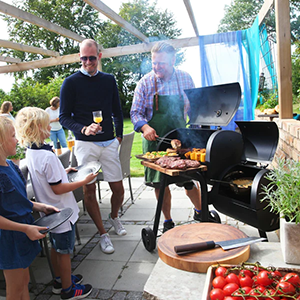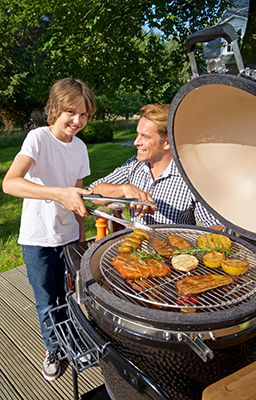Where does the word “barbecue” come from?

I have no idea what name the cavemen gave to roasting food in fire. Perhaps “burning flesh. After all, that’s an expression critics still use in relation to barbecue. Worldwide, there will have been countless designations, for sooner or later, every people on earth learned the art of making fire and employing it for food preparation back in remote antiquity.
A popular explanation for the word barbecue is that it comes from French. For a wild boar on the roasting spit would have had the expression “from beard to tail,” or in French “barbe-et-queue.” Nice thought, but there is no documented evidence for this explanation older than 1938, the year the Larousse Gastronomique was published, a culinary reference book that attributed a French origin to everything edible. Barbecue had by then been a well-established concept in the United States for more than a century and a half.

Another myth, that barbecue is an American expression, originated in Texas, where a wealthy ranch owner, Barnaby Quinn, branded cattle with his initials BQ and a straight line (English: bar) above it. As a result, the cattle meat he served his guests would have become known as BarBQ.
The equally American claim that barbecue is derived from a popular drinking establishment (bar) with a billiard table (a cue is cue in English) where roasted meat was served in addition to beer (so bar, beer & cue), can also be pardonably relegated to the realm of fables. The United States’ influence on modern barbecue has been huge, but with the name, Americans have nothing to do with it.

The most plausible explanation is that the origin of the word barbecue is to be sought in “barabicu,” a word used by indigenous peoples in the Caribbean and South Florida in the 16th century for roasting meat and fish on a wooden grate hung on skewers over a fire.
Spanish explorer Gonzalo Fernández De Oviedo y Valdés described this method in his 1526 travelogue and called it “barbecoa.” It was not until the 17th century that the English translation, barbecue, made its appearance. Originally, the word was used exclusively as a verb (prepare food). Only later did it also become known in the form of noun (a barbecue as a cooking appliance).
In the modern sense, say since the late 18th century, the word barbecue has become more and more inseparable from the United States. This has not little, but everything to do with commerce. You can say what you want about Americans, but clever is when you manage to twist history in such a way that you can recite 400,000 years of cooking history as the national heritage of a country that has been around for less than 225 years. And leave no doubt that Americans cherish barbecue and grilling, as cooking food over an outdoor fire is an unwritten part of the Bill of Rights in that country.







